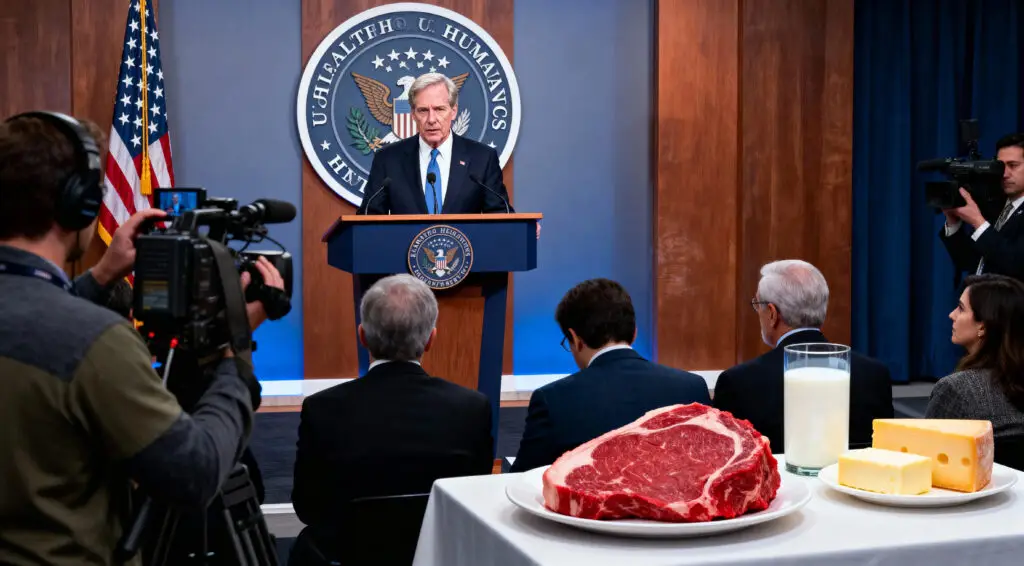Kennedy’s Dietary Proposal Defies Longstanding Nutrition Science
Robert F. Kennedy Jr., the U.S. Secretary of Health and Human Services, is getting ready to tell Americans to consume more saturated fats. This goes against decades of proven nutritional knowledge. Kennedy told reporters that the new rules will “stress the need to eat saturated fats from dairy, good meat, fresh meat, and vegetables.”
Researchers and health groups are shocked by the suggestion since they have long cautioned that eating too much saturated fat raises the risk of heart disease and high cholesterol. Some people worry that Kennedy’s method might hurt public health results and undo years of making decisions based on evidence.

Source: NPR
Heart Experts Alarmed by Sudden Policy Shift
Dr. Cheryl Anderson, a member of the American Heart Association board, noted that many people were shocked by the news. She said, “The advice about saturated fat has been one of the most consistent in all U.S. dietary guidelines.” Anderson said she first decided to “stay calm and see what happens,” but she called the sudden change “deeply concerning.”
She stressed that the data that links saturated fats to heart disease is still evident. She cautioned, “The more saturated fat people eat, the more likely they are to have high cholesterol and heart disease.”
Researchers Split on Interpretation of the Evidence
Kennedy’s plan “sends the wrong message,” according to Dr. Ronald Krauss, a professor at the University of California, San Francisco, who has researched fats for decades. Krauss’s research has shown that saturated fat may not be as bad for you as people used to think, but he says moderation is still very important.
He said, “Saturated fat is pretty neutral when you replace it with healthy fats like olive oil or polyunsaturated oils.” “But swapping it out for sugars and refined carbs can make things worse.” That doesn’t imply we should consume more of it. Krauss said that Kennedy’s selective use of the information shows a “cherry-picked interpretation” instead of a balanced approach.
Recommended Article: DOH Warns Public Against Using AI Tools for Mental Health Help
Potential Impact on School Lunches and Military Meals
According to the USDA and NIH, saturated fat should not make up more than 10% of the total calories in federally controlled meals like school lunches and military rations. Kennedy’s suggested change may boost that limit to 18% or 19%, which would greatly increase the amount of foods high in animal fats that people eat.
Krauss said that this kind of alteration “could have a bad effect on cholesterol levels in the population and, over time, raise the risk of heart disease.” Experts in public health are worried that the new plan might also change the rules for how food is bought across the country, which would affect millions of youngsters and military members.
Experts Criticize Bypass of Scientific Review Process
The Dietary Guidelines Advisory Committee usually looks at years of peer-reviewed research before making national recommendations every five years. The next study, which will help shape U.S. nutrition policy from 2025 to 2030, has not yet come out.
Anderson said it looks like Kennedy’s agency is skipping this scientific procedure, which she called “unprecedented.” She went on to say, “It’s not normal for the HHS secretary to change dietary advice without the help of the advisory committee.”
Broader Debate Over Nutrient vs. Food-Based Guidance
Both Anderson and Krauss believe that nutrition research should focus on foods instead of individual nutrients, even though they don’t always agree. Anderson remarked, “People don’t eat nutrients; they eat foods.” She suggested that advice should focus on general eating habits rather than individual macronutrients.
Krauss agreed with this point of view but said that Kennedy’s focus on increasing saturated fat “oversimplifies a complex issue.” He said that pushing high-fat diets like red meat might hide other dangers, such as the relationship between processed meats and heart disease.
Scientific Community Urges Caution and Transparency
Nutrition specialists believe that for ethical and practical reasons, it is very hard to do large-scale clinical studies on saturated fat. This means that researchers have to rely on observational data. For decades, research has repeatedly linked high saturated fat diets to heart problems, even if there are certain limits.
Krauss said that Kennedy’s “Make America Healthy Again” speech might make public health a political issue. “He mixes valid points about processed foods with claims about fats that aren’t backed up,” he added. “That mix can easily trick people into thinking that the advice is based on facts when it isn’t.”























